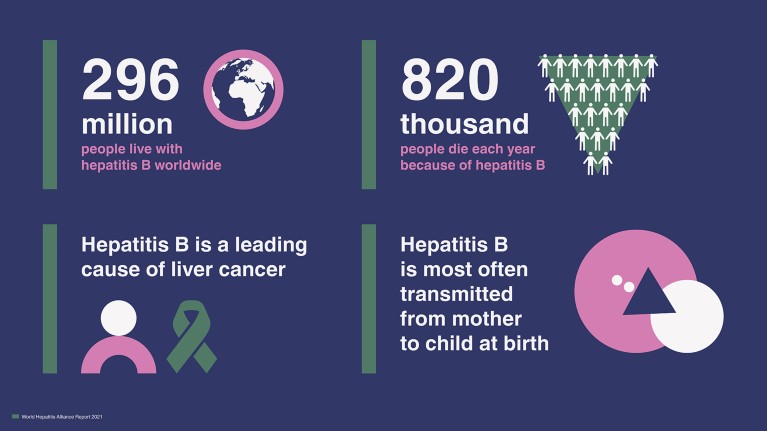Infectious diseases are one of the greatest threats to mankind – evolving, spreading and disproportionately affecting the most vulnerable people. Knowing this, Janssen Pharmaceutical Companies of Johnson & Johnson (‘Janssen’) has an ambitious goal behind the work we do – to create a future where we can prevent the spread of infectious diseases and eliminate the burden that such diseases have on global health. We all witnessed the devastating impact that infectious diseases can have firsthand through the ongoing COVID-19 pandemic, which has dominated news headlines and impacted our everyday lives for the past couple of years. But it’s crucial to remember that COVID-19 isn’t the only infectious disease affecting a significant population across the globe.
Towards a functional cure
Today, nearly 300 million people worldwide live with chronic hepatitis B (CHB), the complications of which cause approximately one death every 30 seconds1. In addition to living with a potentially debilitating condition that often requires lifelong daily treatment, many people living with CHB are faced with an additional burden of stigma and discrimination associated with their disease status (Fig. 1). Janssen recently had the privilege to partner with The World Hepatitis Alliance to sponsor a report that took a closer look at the realities faced by communities, families and individuals impacted by the burden and stigma of CHB across the globe.

Figure 1. Nearly 300 million individuals live with the hepatitis B virus (HBV) worldwide. Many people with HBV face stigma and discrimination in their daily lives.Credit: World Hepatitis Alliance.
Scientifically, advances in our understanding of hepatitis B virus (HBV) are helping to bring researchers closer to new solutions, namely a functional cure – that is, undetectable viral markers for a minimum of six months after a defined course of treatment – which could significantly improve long-term outcomes and health-related quality of life for people living with the virus. A functional cure requires that the infected subject maintains control of the infection through their immune system without continued use of anti-HBV medicines or vaccines.
While tremendous progress has been made to date, there is still more work to be done. Because the interface between HBV and the person hosting the virus (in particular, their immune system) is complicated, reaching a functional cure will be complex. Increasing functional cure rates of people living with HBV remains an important part of a comprehensive strategy to manage HBV more effectively.
As Janssen and other global researchers continue to advance the science towards our mutual end-goal of delivering a functional cure for those living with CHB, we cannot disregard the outstanding need to address the hurdles faced by people living with CHB and their families because of misconceptions, prejudice and outdated policy associated with the disease. Stigma and discrimination against those living with HBV can dramatically reduce one’s health-related quality of life, as well as one’s willingness to seek out and undergo treatment2. While patient education is a key component of helping link those with HBV to solutions, global collaboration across a wide breadth of stakeholders remains essential in achieving a meaningful difference.
The harmful effects of stigma and discrimination
Stigma can be thought of as a ‘mark’, either real or perceived, that negatively sets someone apart from others, causing feelings of exclusion and isolation3.
Health-related stigma is often rooted in fear and lack of understanding about infection, transmission, living with the disease, taking a daily medication or other factors leading to societal judgment and blame. Stigma becomes discrimination when an individual is actively treated unfairly or denied services or freedoms. For individuals living with CHB, this discrimination can come in the form of workplace or educational screening procedures, refusal of housing because of health status, and denial of healthcare services needed to effectively diagnose and manage their disease4. This stigma may impact not only the mental well-being and health-related quality of life of people living with CHB, but their loved ones and family as well. As the majority of people with HBV are infected at birth, stigma can affect individuals across their entire lifetime4,5. These challenges remain major – often unrecognized – barriers to successful prevention, diagnosis and treatment, and are largely the result of misinformation and fear.
Fortunately, as we work collectively towards achieving a functional cure to provide clinical benefit for patients living with CHB, our progress may also contribute to eliminating CHB-related stigma and discrimination.
Removing barriers to improve health outcomes
In 2021, Janssen sponsored a report4 by the World Hepatitis Alliance to examine the burden of CHB globally and provide recommendations for addressing the ongoing barriers for patients and their families as a result of stigma and discrimination. The report, titled ‘The impact of stigma and discrimination affecting people with hepatitis B’, highlights human experiences to demonstrate the personal impact that stigma and discrimination can have on mental health, health-related quality of life and human rights. Importantly, the report identifies several key policy recommendations that can be taken now to dramatically improve millions of lives around the globe. This includes, but is not limited to, prioritizing accurate and non-stigmatizing hepatitis education for all healthcare professionals, improving access to equitable and affordable care, implementing and enforcing anti-discrimination laws, and increasing funding for HBV-specific programmes.
Policy- and decision-makers around the globe can play a critical part in advancing these recommendations, but collaboration is key when it comes to community solutions. By engaging a multitude of stakeholders such as those in public health, education, health systems and civil society, global and community leaders can make meaningful differences when it comes to eliminating stigma and discrimination, while we simultaneously work towards achieving a functional cure on the clinical side.
Hepatitis can’t wait
Through advances in science and continuing education, Janssen is committed to reducing the burden of disease and stigma associated with CHB. We applaud the efforts of scientists and leadership in all sectors, from private companies to government to major industry players, who are working tirelessly in pursuit of a functional cure for CHB, and potentially the elimination of stigma.
It is our belief that one day, our collective knowledge and progress towards this goal will result in a better future for millions of people around the world. By ensuring we don’t lose sight of the steps that can be taken as we progress in this shared journey, including identifying and implementing actions to address stigma and discrimination, we can begin to make that dream of a better tomorrow a reality today.

